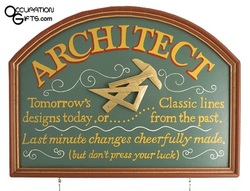 So what do you do after the phone rings? Or after your potential client answers your call, or responds to your marketing? There are two things every client is looking for: technical competence and trust. In other words, do you know what you are doing and can I safely put my project in your hands? Once you have your prospect's attention, remember "it is all about them". Let your marketing take care of the competence stuff. If they have concerns, let them bring them up. A competent person doesn't try to convince you of how competent they are. Take the approach of the doctor, but rather than "What seems to be the matter?", start with "What do you have in mind?". Then listen -like a psychiatrist, "I see…"; "What do you mean by that…"; "Tell me more about that…". Let them do 90% of the talking. They don't want to hear what you would do for them until they are sure that you know what they want. From time to time recap what you have been told. Take notes to show you respect their information and want to capture it. If this is a real project, this conversation will go on for an hour or more. If they see you as a commodity, they will ask for a proposal long before an hour is up. Depending on how much you need the work either comply in writing or decline right there on the basis of not knowing enough about their project to prepare a meaningful proposal. Things are not likely to go well for the client that doesn't have time to tell you what he has in mind. When it doesn't, they will remember the guy who 'screwed it up' AND the guy who wanted to do it right. At the end of the meeting promise a recap in writing as quickly as you are comfortable doing it. Don't over-promise and under-deliver. (That's a good rule to live by.) Seeing their thoughts in writing is very powerful. They know they told you this stuff, but this is evidence that you heard them, that 'you get it'. As part of this recap, suggest that you meet again to review what you propose for them. The next meeting is about some first steps that they might want to take. THIS IS NOT A BASIC SERVICES FEE PROPOSAL. Every project has five or six key issues that need to be understood - space needs, desired character, context in which it will occur, legal, political and managerial constraints, a timeline, and a budget. Propose to investigate one or more of these for them. Give them as quick a turnaround as possible (to keep the ball rolling) and a fee that seems reasonable enough that they don't feel like they need to get a second quote to do this 'small study'. This should be in writing and you should outline several first steps, but propose the one that you think will answer a question they want answered. Follow through, and repeat. There are many branching-off directions that this process might take. Improvise. Or better, get some real training from one of the gurus. My recommendation is Stu Rose and Trina Duncan, Professional Development Resources, Inc. They authored The Mandeville Techniques that I have been describing here. They have well-thought-out methodologies for everything - cold calling, proposals, interviews/presentations, everything. Invest in yourself and your career. LINKS TO OTHER ARTICLES IN THE SERIES
PART 1 - PROJECTS & BUSINESS DEVELOPMENT PART 2 - MARKETING PART 3 - SALES PART 4 - FINANCIAL MATTERS PART 5 - ADMINISTRATION Comments are closed.
|
x
Archives
February 2024
Categories
All
|
Architekwiki | Architect's Resource | Greater Cincinnati
© 2012-2022 Architekwiki
© 2012-2022 Architekwiki






